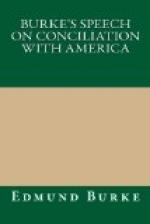My idea is nothing more. Refined policy [Footnote: 8] ever has been, the parent of confusion; and ever will be so, as long as the world endures. Plain good intention, which is as easily discovered at the first view as fraud is surely detected at last, is, let me say, of no mean force in the government of mankind. Genuine simplicity of heart is an healing and cementing principle. My plan, therefore, being formed upon the most simple grounds imaginable, may disappoint some people when they hear it. It has nothing to recommend it to the pruriency of curious ears. There is nothing at all new and captivating in it. It has nothing of the splendor of the project [Footnote: 9] which has been lately laid upon your table by the noble lord in the blue ribbon. [Footnote: 10] It does not propose to fill your lobby with squabbling Colony agents, [Footnote: 11] who will require the interposition of your mace, at every instant, to keep the peace amongst them. It does not institute a magnificent auction of finance, where captivated provinces come to general ransom by bidding against each other, until you knock down the hammer, and determine a proportion of payments beyond all the powers of algebra to equalize and settle.
The plan which I shall presume to suggest derives, however, one great advantage from the proposition and registry of that noble lord’s project. The idea of conciliation is admissible. First, the House, in accepting the resolution moved by the noble lord, has admitted, notwithstanding the menacing front of our address, [Footnote: 12] notwithstanding our heavy bills of pains and penalties— that we do not think ourselves precluded from all ideas of free grace and bounty.
The House has gone farther; it has declared conciliation admissible, previous to any submission on the part of America. It has even shot a good deal beyond that mark, and has admitted that the complaints of our former mode of exerting the right of taxation were not wholly unfounded. That right thus exerted is allowed to have something reprehensible in it, something unwise, or something grievous; since, in the midst of our heat and resentment, we, of ourselves, have proposed a capital alteration; and in order to get rid of what seemed so very exceptionable, have instituted a mode that is altogether new; one that is, indeed, wholly alien from all the ancient methods and forms of Parliament.
The principle of this proceeding is large enough for my purpose. The means proposed by the noble lord for carrying his ideas into execution, I think, indeed, are very indifferently suited to the end; and this I shall endeavor to show you before I sit down. But, for the present, I take my ground on the admitted principle. I mean to give peace. Peace implies reconciliation; and where there has been a material dispute, reconciliation does in a manner always imply concession on the one part or on the other. In this state of things, I make no difficulty in affirming




